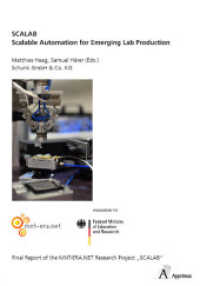Full Description
Despite considerable progress in research and practice in the constructive transformation of intractable conflicts beginning in the 1970s, many terribly destructive conflicts have recently erupted. New circumstances have emerged that have resulted in regressions.
The contributions in this book examine many of the new challenges and obstacles to the transformation of intractable conflicts. It also offers an array of new and promising opportunities for constructive transformations. The book brings together analyses of U.S.-based conflicts with those from many regions of the world. International, intra-state, and local conflicts are explored, along with those that have been violent and non-violent. The diversity in disciplines among the authors provides a wide range of theoretical approaches to explaining how a variety of intractable conflicts can be transformed.
Case studies of local, national, and transnational conflicts serve to illustrate this new landscape. These analyses are complemented by conceptual discussions relating to new conflict systems, actors, dynamics and strategies. Policy implications of findings are also presented.
Contents
1. Introduction, Galia Golan, Hebrew University of Jerusalem; Louis Kriesberg, Syracuse University
2.Gendered Perspective on Intractable Conflicts and Power Sharing, Ayelet Harel-Shalev, Ben-Gurion University of the Negev
3. Mapping and Monitoring Global Insecurity and the Global Illicit Economy: The Effects of Intractable Conflicts, Margaret Hermann, Syracuse University
4. Unrecognized States: Theory, Cases, and Policy Implications, Kristy Buzard, Syracuse University; Benjamin A.T. Graham, University of Southern California; Ben Horne
5. Transformation of Armed Conflict: Lessons from the Arab-Israeli Conflict , Galia Golan, Hebrew University of Jerusalem
6. Dynamics Contexts of Conflict: Complicated Actors and Settings in Northern Ireland , Ronit Berger, Interdisciplinary Center (IDC), Herzliya, Israel
7. Social Media Use and Fear Levels after the Paris 2015 Attacks: A Comparative Study, Bernard Enjolras, Institute for Social Research in Oslo, Norway; Shana Kushner Gadarian, Syracuse Uni







